Senate Bill 2823, sponsored by Sen. Dennis DeBar, would provide a new pathway to receive an occupational license, making it easier to earn a living.
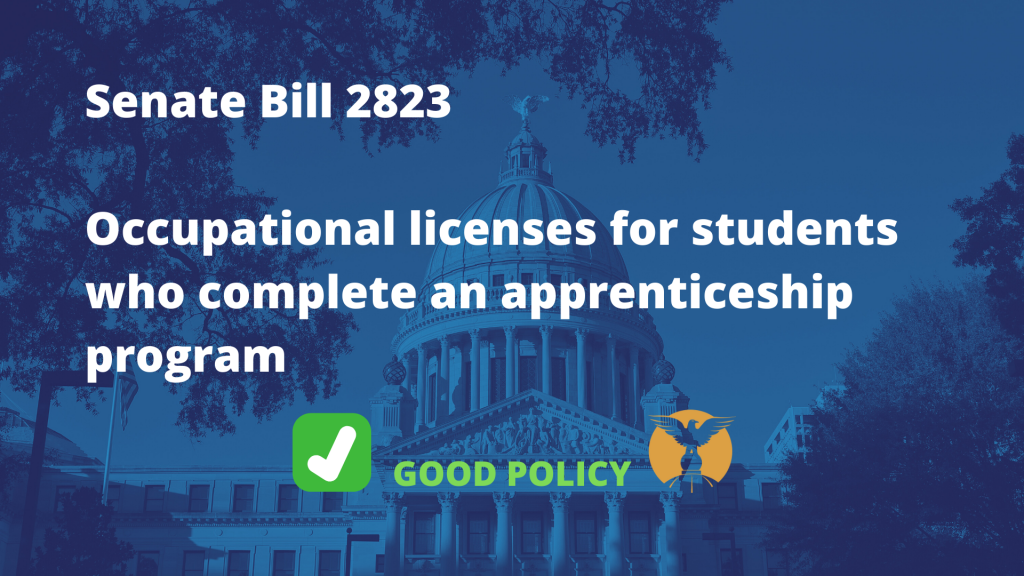
This bill would allow individuals to complete an apprenticeship program in lieu of the traditional classroom hours to obtain an occupational license. You would still need to complete any necessary tests and pay all the required fees. The apprenticeship program will also count toward school credit.
This is a good step toward making it easier to earn a living in Mississippi.
Today, about 19 percent of Mississippians are in an occupation that requires a license. And this is particularly troubling in low and middle-income occupations. Mississippi currently licenses 66 of 102 lower-income occupations, as identified by Institute for Justice.
On average, licensing for low and middle-income occupations in Mississippi requires an individual to complete 160 days of training, to pass two exams, and to pay $330 in fees. Those numbers will vary depending on the industry. For example, a shampooer must receive 1,500 clock hours of education. A fire alarm installer must pay over $1,000 in fees.
The net result is a decrease in the number of people who can work. A study from the National Bureau of Economic Research found that occupational licensing reduces labor supply by 17 to 27 percent.
In Mississippi, the Institute for Justice estimates that licensing has cost the state 13,000 jobs. That represents two Nissan plants that could be created by reducing our licensing burden, and it wouldn’t require a dime in taxpayer incentives.
MCPP has reviewed this legislation and finds that it is aligned with our principles and therefore should be supported.
Read SB 2823.
Track the status of this bill and all bills in our legislative tracker.
Senate Bill 2726, sponsored by Sen. Derrick Simmons, and House Bill 1299, sponsored by Rep. Abe Hudson, would prohibit food establishments from offering plastic straws, unless requested by a customer.
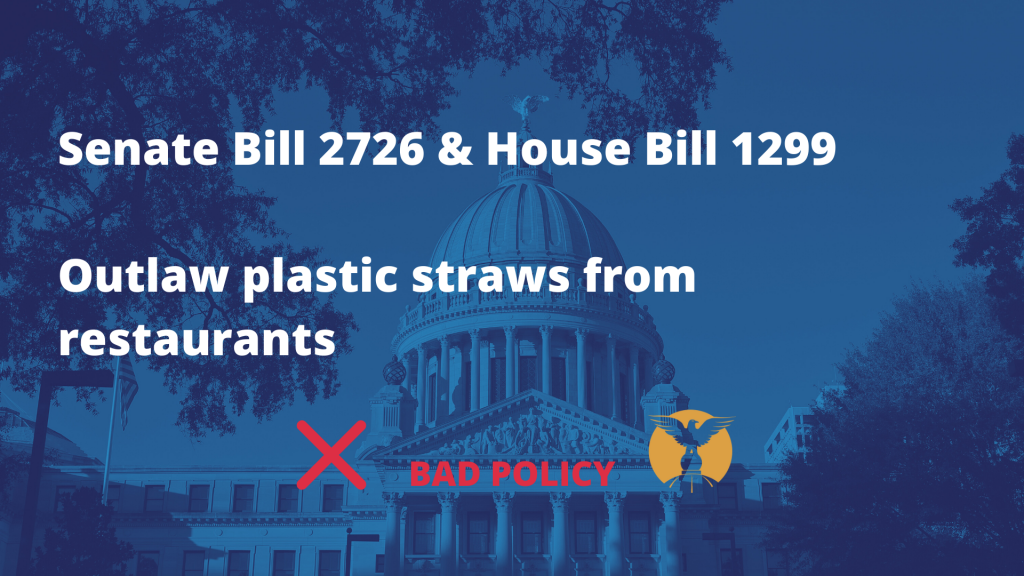
This law would be enforced by the Department of Health and repeat offenders could receive fines of no more than $300 each year.
For the past few years, the left has moved to plastic straw bans in the name of saving the planet after winning the war on the evil cousin to straws, plastic bags. Saving the planet is a noble idea, if in fact you believe we only have limited years remaining. But plastic straws aren’t going to do it. At least not from America. The U.S. contributes about 1 percent of global plastic waste. Because we have well managed waste management and recycling facilities. In contrast, around 80 percent of plastic waste comes from China and other Asian countries that do not.
Many businesses in an attempt to show their wokeness have stopped using plastic straws. However misguided the virtue signaling may have been, it was the decision of a private company, not the state. And that is where it should stay.
MCPP has reviewed this legislation and finds that it violates our principles and therefore must be opposed.
Track the status of this and all bills in our legislative tracker.
House Bill 838, sponsored by Rep. Nick Bain, allows individuals leaving state prisons to use Mississippi Department of Corrections documents as qualifying papers to obtain a driver’s license.
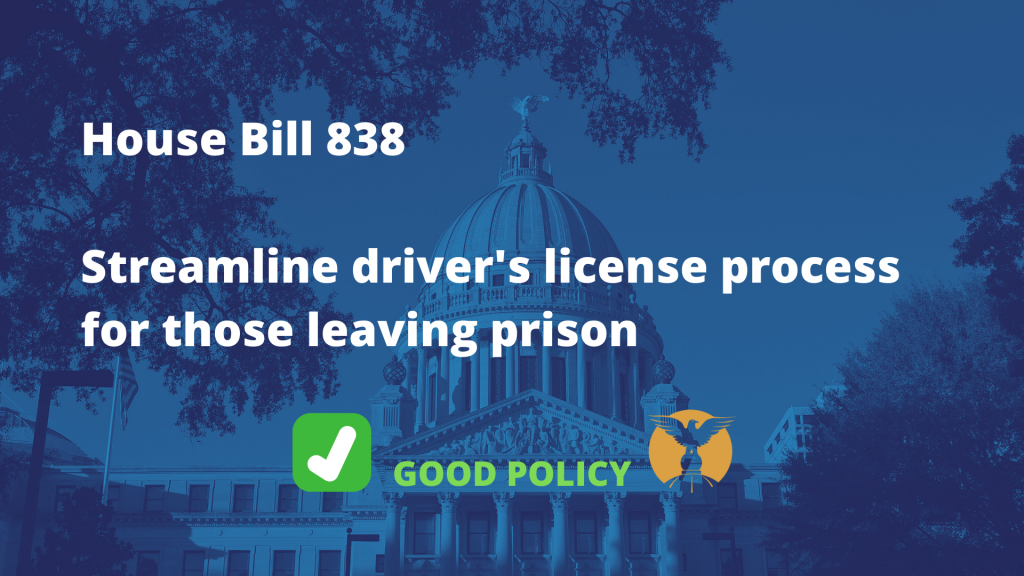
For ex-offenders to land gainful employment, they generally need a driver’s license. Something that has been a hinderance. This will make that process easier by allowing MDOC documents in lieu of a birth certificate or social security card.
As more ex-offenders enter the workforce, we will then see a decrease in our recidivism rate and an increase in our employment rate.
MCPP has reviewed this legislation and finds that it is aligned with our principles and therefore should be supported.
Read HB 838.
Track the status of this bill and all bills in our legislative tracker.
One hundred years ago, almost to the day, our nation crippled the alcohol industry and swept its economic impact under the rug with the launch of nationwide prohibition.
In banning alcohol, we opened the door for the legend of Al Capone, for the literature of F. Scott Fitzgerald in the Great Gatsby, and for the great sport that is NASCAR. And yet, it is now time to fully close the door on this failed policy in Mississippi.
You may think that prohibition ended long ago, but in truth, antiquated laws and regulations have remained on the books which have crippled many small businesses, stifled entrepreneurship, and left Mississippi in the dust when it comes to the modern boom of the alcohol industry. Luckily, sensing the shift in public opinion, a series of bills have been introduced this year in our legislature that would work to release the shackles which have so long weighed down our market in the state.
Sunday sale of alcohol. Grocery stores allowed to sell wine. Direct shipment of wine. Expansion of liquor licenses. Privatization of distribution. Craft brewery freedom. Regulatory reform. A range of great bills have been introduced that would dramatically empower both the consumer and the entrepreneur. These ideas have the capacity to decisively make this the year of alcohol freedom, and officially end prohibition in the state.
This legislation is not just about alcohol, but about one’s fundamental right to make decisions for ourselves without the government trying to make decisions for us. Does the state believe we are not intelligent enough to control our own lives? While this expansion of freedom and personal liberties should truly be enough to stir the heart of any patriot into action, it is also worth noting the dramatic economic impact that these policies could have on our communities.
With many of our leaders discussing workforce development and constantly seeking to attract new business into the state, often with taxpayer money or resources, it becomes all the more critical that we embrace existing market opportunities and encourage entrepreneurship locally. Give the craft brewer the freedom he needs to run a successful business, the store owner the freedom she needs to expand and open multiple stores, and the consumer the chance to choose where he wants to purchase his wine.
The 2018 Economic Impact Study of America’s Beer, Wine & Spirits retailers found that beverage retailers alone create more than 2.03 million jobs from the sale of alcohol. The direct economic impact of the retail industry is “more than $122.63 billion annually; the total economic impact of the industry is $363.33 billion annually. This creates $47.9 billion in local, state, and federal taxes.” Yet, we have turned our back on these jobs and this investment, by restraining our local businesses and making it difficult, if not impossible for them to operate.
Furthermore, while the entire alcohol industry is growing around the country, the Beverage Information Group has found that it is the small businesses in the market who are expanding the fastest. Thus, in continuing our current policies, we hurt local small businesses the most. With massive restrictions on how breweries and distilleries can sell directly to customers, it is no wonder that Mississippi is annually ranked last in terms of craft beer production. While this industry operates with $650 of economic production per capita in Vermont, in Mississippi it only produces $150 per capita. This industry is so impactful, the University of Vermont even offers a program on the business of craft beer.
Imagine the degree of growth we could experience if we released the chains that we have used for so long to tie down our small businesses in Mississippi, within the alcohol industry and beyond. Only by finally and truly ending prohibition in the state, can we launch an economic expansion powered by alcohol freedom.
Not only do we deserve the liberty to build businesses and make consumption choices without government shutting us down, but we deserve to experience the economic growth and investment in our economy that so many other states are currently seeing. I dream of the day that I can enjoy a locally brewed beer with the knowledge that I live in a state that encouraged that small business to flourish and expand rather than wither.
This column appeared in the Meridian Star on February 21, 2020.
House Bill 979, sponsored by Rep. Brent Powell, would end the state’s prohibition on alcohol.
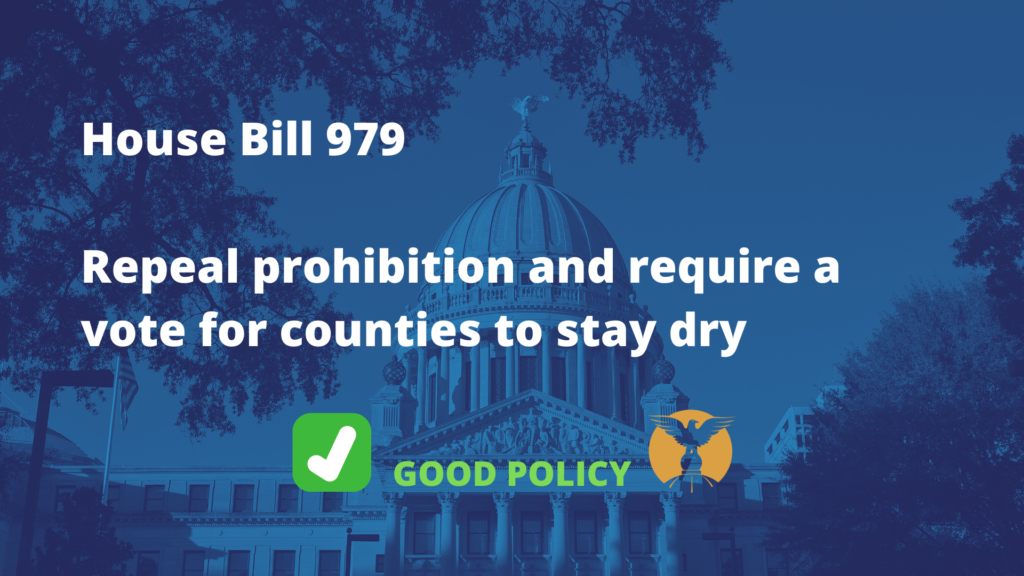
Right now, the state has a patchwork system from the 1966 repeal of prohibition because of local control over alcohol sales. The default setting for counties and cities is dry and changing it requires an election.
This bill would change the default status of counties to wet and require an election for a county to become dry once more. Right now, according to data from the Mississippi Department of Revenue, there are 31 counties in the state. Simpson county was the latest county to go from dry to wet after an election last year. Rankin county is the largest "dry" county in the state, though Pearl, Brandon, and Flowood allow liquor by the glass. Beer is available for sale at grocery stores and convenience stores, but liquor stores are prohibited.
This bill would end the requirement for “qualified resort areas” in dry counties where liquor can be served. The Mississippi legislature has to pass a bill for each area and these bills pop up every year. The counties that don’t want to allow the sale of alcohol will still have the option to remain dry.
Mississippi has many laws on the books that restrict alcohol freedom in the state. Perhaps none is more stifling than the current default as a dry state. This bill would provide for economic growth in the numerous dry counties where residents simply cross county lines to purchase alcohol.
MCPP has reviewed this legislation and finds that it is aligned with our principles and therefore should be supported.
Read HB 979.
Track the status of this bill and all bills in our legislative tracker.
Medicaid expansion for the able-bodied in Mississippi will lead to more government dependence, much higher government spending, and won’t save rural hospitals, according to research from the Foundation for Government Accountability.
Mississippi is one of 14 states remaining that haven’t adopted the expansion of Medicaid under the Affordable Care Act, better known as Obamacare, for able-bodied, working adults up to 138 percent of the poverty level.
Nic Horton is the research director of the FGA and has compiled some data on possible Medicaid expansion in the state. He says that Medicaid expansion is offensive to him because the program was originally intended to cover the health care needs of the disabled and elderly populations.
“Mississippi should really be proud that they’ve made the right decision on this for so long,” Horton said. “The states that have gone down this path have regretted it. When you go state by state, you find this is a program that can’t be controlled. There are no time limits.
“No work requirements. It’s an unlimited, open-ended welfare program for able-bodied adults.”
There are two Democrat-sponsored bills in the Senate, SB 2499 and SB 2181 that would expand the state’s Medicaid program under Obamacare. Both have been double-referred to the Medicaid and Appropriations committees.
Listen Now: Talking Medicaid expansion with Nic Horton, research director at FGA
The price tag to expand Medicaid won’t be cheap. The FGA estimates that the part of expansion paid by Mississippi taxpayers would add up to $28 billion over the first decade. That’s a much higher cost than predicted by a 2012 study by the Institutes for Higher Learning.
This study said Medicaid expansion would cost state taxpayers $148.7 million in 2021 in a high enrollment scenario (95 percent participation by eligible residents.
For comparison, the state’s general fund appropriations in 2020 added up to $5.746 billion.
As for claims that Medicaid expansion is the salve for the closure of struggling rural hospitals, Horton said this isn’t the case. According to FGA research of 1,700 hospitals with six years of financial data, the effects of expansion on the net finances of hospitals was close to zero.
Expansion was also found by the FGA to be associated with higher hospital shortfalls, a fact confirmed by the Moody’s Investor Service, a bond rating firm that issues credit ratings for hospitals nationwide.
“Medicaid was never intended to be a slush fund for hospitals,” Horton said. “We have Medicaid as a safety net for people who have nowhere else to turn. Even if it were a cure-all for every hospital in the country, I don’t think it’d be worth the human cost to the safety net for the people who need it.”
Horton says the expansion will also crowd out private insurance. In Mississippi, the FGA says that 48 percent of those eligible for potential Medicaid expansion already have private coverage and 14 percent qualify for plans on the exchange.
Nationally, 13 million able-bodied adults are now on Medicaid because of Obamacare expansion and states that have expanded Medicaid have enrolled 110 percent more adults than expected.
This is one of the reasons why Medicaid’s finances are taking on water. According to a 2017 report from the actuaries at the Centers for Medicare and Medicaid Services, expenditures for Medicaid will grow by 5.7 percent each year and will expand from $370 billion in 2017 to more than $1 trillion.
This means one out of every five dollars spent in the U.S. will be on health care. Just the cost of expanding Medicaid to able-bodied adults under Obama Care were expected to amount to $855 billion in new federal spending between 2017 and 2026.
Louisiana is an excellent example of the phenomena of massive growth in excess of predictions of both enrollees and spending. The Pelican State expanded Medicaid in 2016 and projections said that 306,000 new people would enroll. Those numbers have grown exponentially to 468,415 this year, a 53 percent increase.
In October 2014, Louisiana’s Medicaid program served 1,051,248 residents, including those on theChildren's Health Insurance Program. By October 2018, the program was serving 1,462,452 residents.
Indiana is another good example of the effects of Medicaid expansion. General fund spending on Medicaid in the Hoosier State increased by 26.9 percent, growing from $1.98 billion in 2014 to $2.7 billion in the 2021 budget.
Medicaid went from 13.7 percent of the state’s general fund budget in the 2014 and 2014 budget cycles to 14.8 percent in the 2020 and 2021 budgets.
In 2013, the Hoosier State had 1,120,674 enrolled in Medicaid and CHIP programs. By July 2019, that number swelled to 1,421,594, an increase of 26.85 percent or a difference of more than 300,000.
Expanding Medicaid would also will have fraud issues. According to the FGA, state legislative auditors in Louisiana found that 19,226 expansion enrollees did not qualify for benefits, but were still enrolled in the program, receiving between $61.6 million and $85.5 million in benefits.
In Minnesota, 15 percent of the able-bodied adults sampled earned money in excess of eligibility limits.
Numbers from the FGA show that 45 percent of potentially eligible able-bodied adults already have private insurance coverage and states that have expanded Medicaid have experienced a shift from private coverage to Medicaid.
The divide between my millennial generation and older ones is stark.
While millennials are better educated than prior generations, we are also the least happy. Millennials have higher rates of anxiety, are generally disengaged at their jobs, and are deeply fearful about the future.
Some would argue that these feelings are the natural consequence of a world filled with greater uncertainty. But are we truly living in a more uncertain time than the Cold War, the Great Depression, or other traumatic periods in American history?
With unprecedented wealth and prosperity levels and general global stability, the evidence seems to suggest otherwise. Something else must be causing the worrisome downward trend in millennial emotional health. I have an idea of what that cause might be.
In college, my classmates and I were constantly encouraged by fellow students, professors, and speakers to “pursue our own truth” and to “do what makes us happy.” Even at my alma mater Georgetown, a Catholic University, morality and truth were little more than relativistic tools to be used at our disposal and justify immediate gratification.
Universities were once intended to be bastions of academic freedom in which young scholars grappled with big ideas, pursuing truth with a capital “t.” Today, we’re encouraged to dive into any field of study we care for, with little guidance or constructed hierarchy when it comes to valuable knowledge.
Our professors told us we could find purpose in temporal affairs, yet we somehow lost the sense that we were a part of something greater. We substituted a wholehearted pursuit of “the truth” for “our truth.”
The dominant philosophy today is built on a self-focused worldview that everything we need to know can be found on our own. The idea of pursuing one’s own truth requires a great deal of pride. It gives a false sense of comfort to the individual that he or she can look within to determine all that is right or wrong and needs little beyond that. Those who do so, however, find themselves disappointed by the shallowness of the world, lacking answers to difficult questions, and grasping for deeper meaning to no avail.
Perhaps it is time for us to seek alternatives.
Declining rates of religiosity correspond with millennials’ growing disenchantment with the world. Studies consistently show religious participants to be happier and more engaged members of society, but millennials are largely missing out.
Religion provides an individual with a community of people who care about one another’s well-being. Those involved in organized religion show a greater likelihood to vote, engage in charitable giving, and volunteer for service organizations. Religion also provides a foundation and worldview through which to interpret the events of the world and process tragedy and grief.
Those who join a religious community have access to a rich history of thinking. Rather than each individual assuming the burden of defining their own moral code, crucial to most faiths is the willingness to humble one’s self at the doorstep of history and recognize the thoughts and ideas of those who have gone before.
Man’s search for meaning continues. The question at hand is whether young people will continue to cut themselves off from the institutions which offer the deepest opportunity to discover the greater truth which exists beyond our own selves, or instead continue to find themselves persistently unhappy.
We must reject the moral relativism perpetuated by our current culture and education system. Instead, we need to recognize that the greatest truth is only found beyond our own selves.
This appeared in Intellectual Takeout on February 20, 2020.
Senate Bill 2830, sponsored by Sen. Josh Harkins, would expand the state’s Right to Try law.

Right to Try laws gives terminally ill patients the ability to try medicines that have not yet been approved by the federal government for market. Mississippi enacted Right to Try legislation in 2015, part of a movement that has swept across the country. To date, 41 states have enacted similar legislation and it became federal law in 2018.
This bill would expand the current list of eligible patients to an individual with a traumatic injury and would also allow adult stem cells as a treatment option.
This would expand upon the current individual freedoms for terminally ill patients who have exhausted their government-approved options and are simply looking for another option.
MCPP has reviewed this legislation and finds that it is aligned with our principles and therefore should be supported.
Read SB 2830.
Track the status of this bill and all bills in our legislative tracker.
House Bill 1210, sponsored by Rep. Dana Criswell, and Senate Bill 2725, sponsored by Sen. Chuck Younger, would allow for the cultivation of hemp in Mississippi. This is currently legal in 47 states.
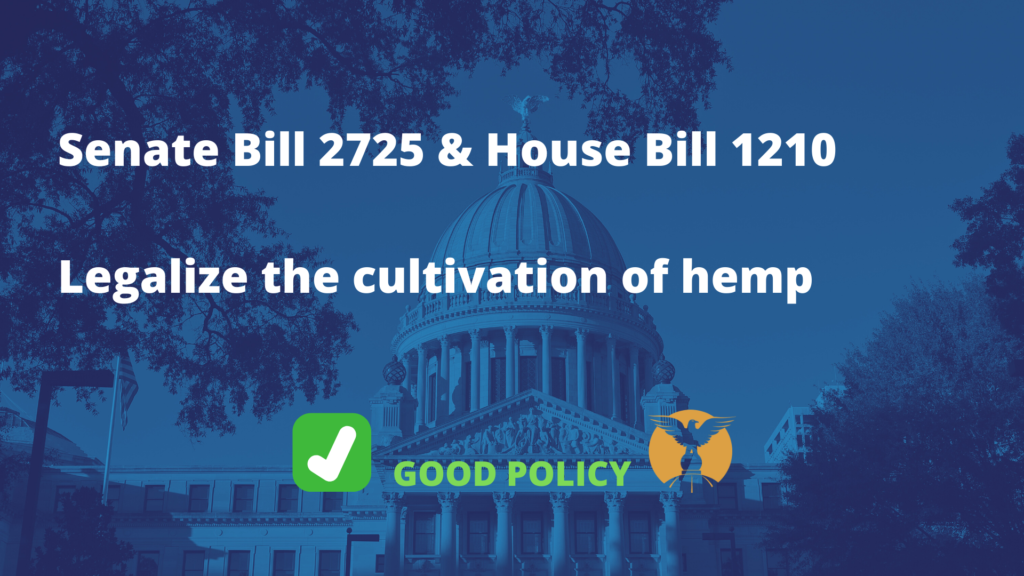
We have seen a massive move toward hemp legalization at the state level after the 2018 Farm Bill expanded the cultivation of hemp. Previously, federal law did not differentiate hemp from other cannabis plants, even though you can’t get high from hemp. Because of this, it was essentially made illegal. But we did have pilot programs or limited purpose small-scale program for hemp, largely for research.
Now, hemp cultivation is much broader, with the Farm Bill allowing the transfer of hemp across state lines, with no restrictions on the sale, transport, or possession of hemp-derived products. There are still limitations, but most states have taken the opportunity to find new markets for those who would like to cultivate hemp.
While law enforcement has raised concerns about the inability to distinguish between hemp and marijuana, that should not distract from the fact that hemp could be an economic boost for many, and something the state should not prohibit.
MCPP has reviewed this legislation and finds that it is aligned with our principles and therefore should be supported.
Track the status of this bill and all bills in our legislative tracker.
